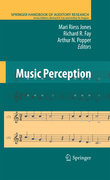
The increasing prevalence of musical stimulation in our everyday environment makes studies of musical listening, comprehension and memory important. Music has simply become a pervasive aspect of the experienced environment for most of us; along with enhanced levels of machine sounds, musical sound sources are contributing to a virtual transformation of contemporary soundscapes occurringin many industrial countries. In spite of such trends, arguably the mainstream research in psychology and related fields has been slow to devote concentrated attention to this phenomenon and what it might mean. As a result, with respect to more established fields of research (e.g., visual perception, speech perception, attention and memory etc.), less is known about how people perceive and respond to complex, non-random, acoustic signals found in musical events. Although these topics reside in the domain of music research, this field is a relatively new one, with a history that dates back only about 25 years. Nevertheless, it is now a vibrant and rapidly growing field that draws from multipledisciplines (psychology, psychoacoustics, computer science, music theory, andso forth) to seek answers to questions about how we listen to musical events in our world. It tackles questions about pitch perception in complex patterns,about the role of tonal schemes as well as effects of metrical and rhythmic schemes on musical listening behaviors. It also examines abilities of children and adults to perceive and comprehend dynamic sound patterns. Emotional responses to music are also studied; and overarching all of this are exciting new neuroscience findings concerned with neural responses to musical events. Music Perceptionintroduces its audience to these and related basic issues concerned with listening to music. It also illustrates how knowledge about music perception may ultimately lead to a broader understanding of conventional concepts regarding perception, attention and memory." Provides a comprehensive overview ofissues confronted by researchers in music perception/cognition First unifyingvolume on music perception Chapters written by leading researchers in the field. INDICE: Introduction.- Pitch Perception.- Tonality- Dynamical Approaches to Music.- Tempo and Rhythm.- Perceiving and Recognizing Melodies.- Musical Structure and Emotion.- Developmental Aspects of Music Perception.- Music and theBrain.- Conclusion.
- ISBN: 978-1-4419-6113-6
- Editorial: Springer
- Encuadernacion: Cartoné
- Páginas: 350
- Fecha Publicación: 29/05/2010
- Nº Volúmenes: 1
- Idioma: Inglés
